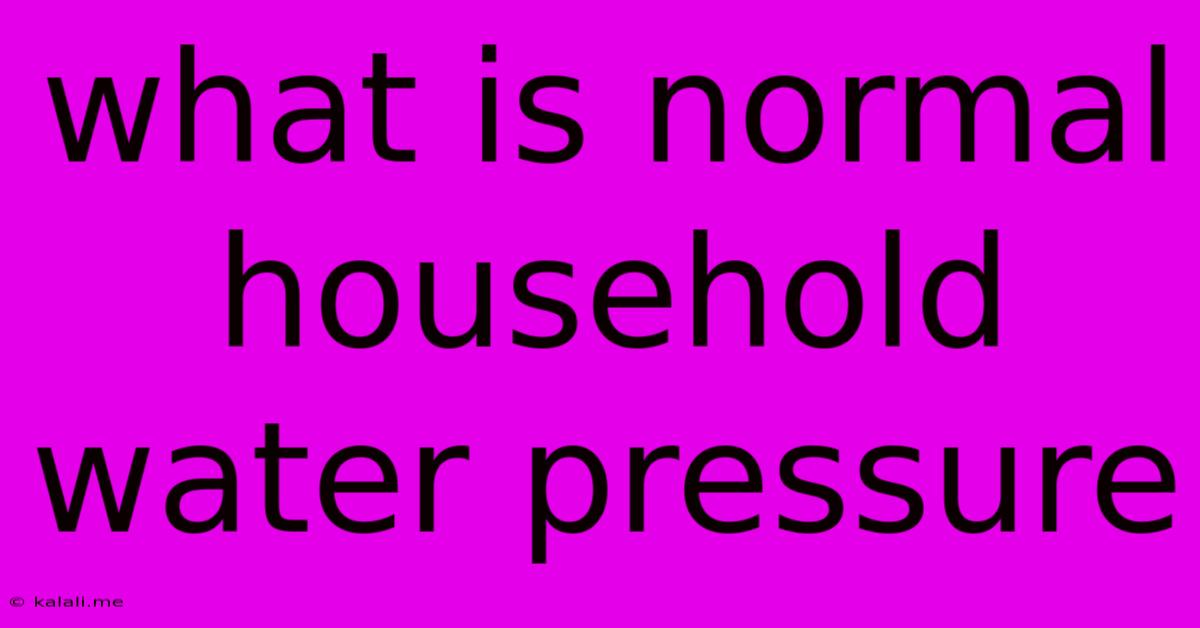What Is Normal Household Water Pressure
Kalali
May 31, 2025 · 3 min read

Table of Contents
What is Normal Household Water Pressure? A Comprehensive Guide
Knowing your household water pressure is crucial for ensuring efficient plumbing and appliance function. Too little pressure leads to weak showers and sluggish drains, while excessive pressure can damage pipes and fixtures. This guide will help you understand what constitutes normal household water pressure, how to measure it, and what to do if yours is outside the ideal range.
What is Considered Normal Water Pressure?
The ideal household water pressure generally falls between 40 and 60 pounds per square inch (PSI). This range ensures adequate water flow for most household needs without putting undue stress on your plumbing system. While some variation is normal throughout the day and depending on water demand within your neighborhood, consistently falling outside this range warrants investigation. Think of it like this: 40 PSI is a gentle, reliable stream, while 60 PSI is a strong, consistent flow. Anything outside this range may indicate a problem. We'll delve into the reasons for fluctuations later on.
Factors Affecting Water Pressure:
Several factors can influence your household water pressure, including:
- Water main pressure: Your local water utility is responsible for maintaining sufficient pressure in the main water lines supplying your neighborhood. Low main pressure affects all homes on that line.
- Distance from the water main: The farther your home is located from the main water line, the greater the potential for pressure drop due to friction within the pipes.
- Pipe diameter: Smaller-diameter pipes restrict water flow more than larger ones, leading to reduced pressure.
- Pipe material: Older pipes, especially those made of galvanized steel, can corrode and restrict water flow over time, resulting in lower pressure.
- Number of fixtures in use: Multiple fixtures running simultaneously (showers, toilets, washing machines) can decrease pressure available to individual outlets.
- Clogged pipes: Mineral buildup, sediment, or other debris in your pipes can significantly reduce water flow and pressure.
- Water meter issues: A malfunctioning water meter can restrict water flow to your home.
How to Measure Your Water Pressure:
Measuring your water pressure is relatively straightforward. You'll need a water pressure gauge, readily available at most hardware stores. Follow these steps:
- Turn off all water-using appliances: Ensure no faucets, showers, or appliances are running.
- Locate your main water shutoff valve: This is usually located near the water meter.
- Attach the pressure gauge: Connect the pressure gauge to an outside faucet, making sure it's tightly secured.
- Turn on the faucet: Open the faucet fully.
- Read the gauge: The gauge will display the water pressure in PSI. Record the reading.
- Repeat the process several times: Take multiple readings at different times of the day to get a more accurate assessment.
What to Do if Your Water Pressure is Too High or Too Low:
- Low Water Pressure: Investigate the potential causes listed above. You might need to check for leaks, clear clogged pipes, or contact your local water utility if the main water pressure is consistently low.
- High Water Pressure: High water pressure can cause significant damage to your plumbing. Contact a qualified plumber to adjust your pressure regulator or investigate the source of the excessive pressure.
Conclusion:
Maintaining optimal water pressure is essential for a functioning household. By understanding what constitutes normal pressure, how to measure it, and what to do when it's outside the ideal range, you can ensure your plumbing system operates efficiently and effectively. Remember, consistency is key; if you experience persistent problems, don't hesitate to consult a professional plumber. They can identify the underlying cause and recommend suitable solutions.
Latest Posts
Latest Posts
-
3 Way Switch Light In The Middle
Jun 01, 2025
-
What Is An Ip Helper Address
Jun 01, 2025
-
Keeping Flimsy Lapto Charger From Hanging Off The Laptop
Jun 01, 2025
-
Which Side Of Parchment Paper Goes Up
Jun 01, 2025
-
How To Fill Gaps In Timber Floorboards
Jun 01, 2025
Related Post
Thank you for visiting our website which covers about What Is Normal Household Water Pressure . We hope the information provided has been useful to you. Feel free to contact us if you have any questions or need further assistance. See you next time and don't miss to bookmark.